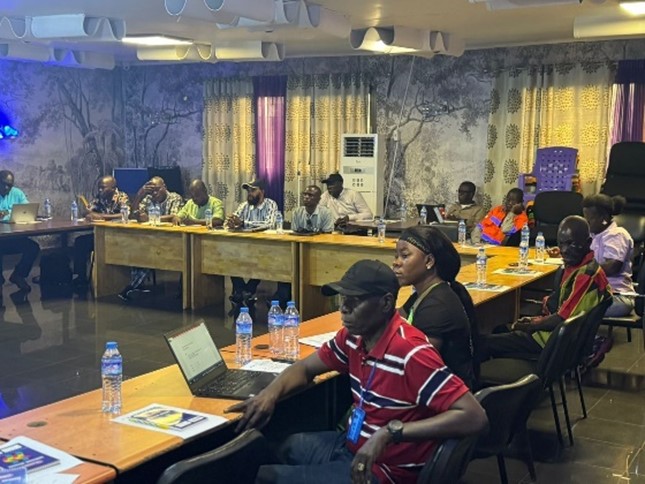The 10th Assembly of the World Council of Churches (WCC) in 2013 called the ecumenical family to join and walk together in a Pilgrimage of Justice and Peace, bringing those left on the margins to the center. As part of this process, and as mandated by the WCC Assembly Statement on the Human Rights of Stateless People, the WCC has strengthened its efforts to raise awareness about the rights of the most vulnerable groups in society, including stateless people.
Stateless people, estimated at 15 million worldwide, are individuals who are not recognized as citizens by any country in the world, and consequently are denied basic human rights. These are rights that others often take for granted: the right to health care, to education, to own property, to travel, to get a birth or death certificate. Stateless people are vulnerable to discrimination, exploitation and violence.
The World Council of Churches has recognized and termed the Apostolic Pentecostal Church’s effort contributing to ending statelessness in Liberia, Africa, and the global village as a true theological calling.
Speaking recently in the city of Careysburg, Margibi County, the WCC head of delegation to Liberia and keynote speaker, Dr. Benjamin K.L. Simon, praised the immediate past President of the Liberia Council of Churches and head Bishop of the Apostolic Pentecostal Church, Bishop Kortu K. Brown, for his enormous role in helping to end statelessness.
Samson named the Apostolic Pentecostal Church as member of a corporation to end statelessness globally, including UNICEF, UNCHR and the WCC, which he described as “restoring God-given dignity” to the most vulnerable population.
According to the WCC delegate, since May 2016 the World Council of Churches and its Commission of Churches on International Affairs organized a regional treading workshop on birth registration, gender discriminatory nationality law, APC has been seriously engaging statelessness through birth registration.
Samson further stated that the right to nationality is a threshold issue for excess protection to all other human rights, while highlighting that all human are equally created by God and deserve equal treatment.
Representing the Liberian government during the occasion, Margibi County’s district #3 lawmaker, Ava Jones, vowed to join the campaign to end statelessness in Liberia.
Making remarks, Representative Jones disclosed that no child born of a Liberian father or mother should be denied a right to citizenship, something the lawmaker described as “flagrant disregard for human dignity”.
In his remarks, the lawmaker bragged of the Legislature’s decision to amend the Alien and Nationality Law, allowing dual citizenship, something he termed as essential to ending statelessness in Liberia.
Also speaking during the occasion, Bishop Kortu K. Brown disclosed that APC has provided 3,000 birth certificates through Church Aid Liberia, a local NGO operated by the mission.
Bishop Kortu Brown, who is the immediate past President of the Liberia Council of Churches, further disclosed that APC will continue to engage statelessness through birth registration and robust advocacy for Liberian women to pass on their citizenship to their children.
Today, a small minority of countries worldwide continue to uphold the discrimination under the nationality laws, preventing women from passing on their nationality to their children. Liberia is one of the 27 countries around the world whose Alien and Nationality law presently in effect discriminates against women by allowing children born outside Liberia to Liberian fathers the right to citizenship but denying Liberian women the same right to pass on citizenship to their children born abroad to non-Liberian fathers.
Yet, the consequences of this unequal system for affected families are significant not just in terms of rights and status, but also wellbeing and security. The state too is held back when a section of the population is excluded from fully participating in society as a product of discriminatory nationality regimes.
Looking at the Constitution, it contradicts the nationality law because it gives rise to women equality in area of nationality. Article 28 of the 1986 Constitution states that any child who has a parent who was a Liberian citizen at the time of birth is a citizen, provided that the person renounces any other nationality upon attaining maturity.
The alien and nationality law denies equality to women and men, and can also result in severe consequences for children, leaving them vulnerable, at risk of statelessness and frequently without access to publicly-funded education, health and social benefits and economic opportunities.
“As the nationality law is at odds with the Liberian Constitution, which establishes at Article 28, we are respectfully urging the Legislature to remove the discrimination from the nationality law in line with provision of the Constitution which guarantees fundamental rights and freedoms for all, irrespective of sex, as well as with Liberia’s international obligations.
“We want to applaud the efforts by the Liberian Senate to amend the Alien and Nationality Law to uphold women’s equal right to pass citizenship to their children, bring it in line with the Constitution and the government who has pledged to work to ensure the passage of an amendment to the Alien and Nationality Law to address issues of gender discrimination during the Abidjan Declaration of ECOWAS Ministers on the Eradication of Statelessness in West Africa,” Bishop Kortu Brown noted.







